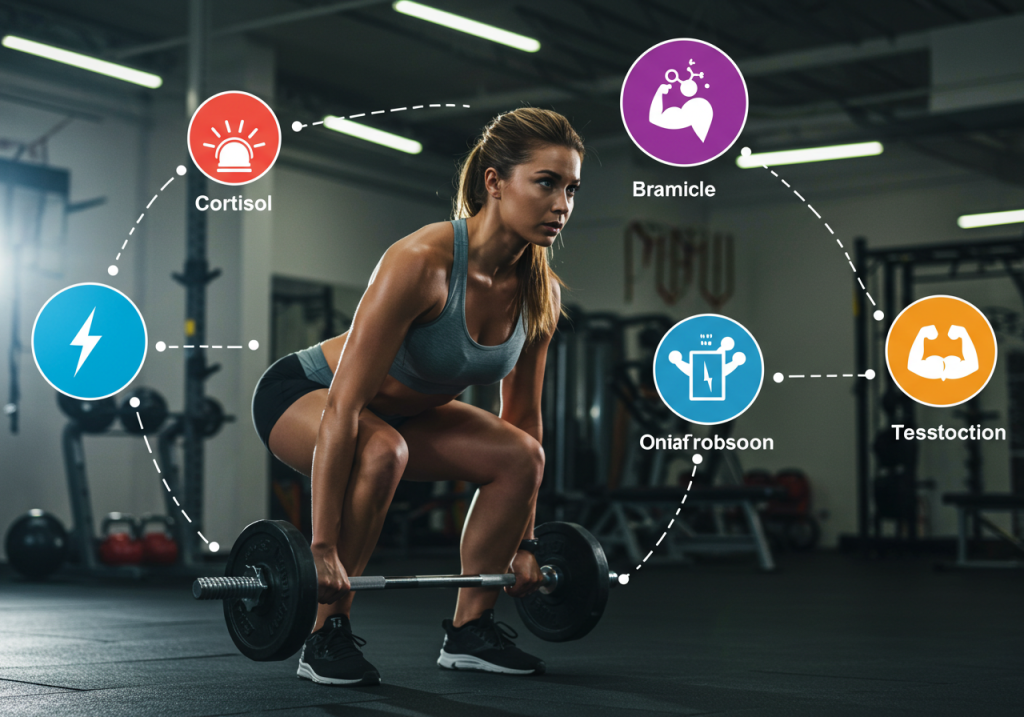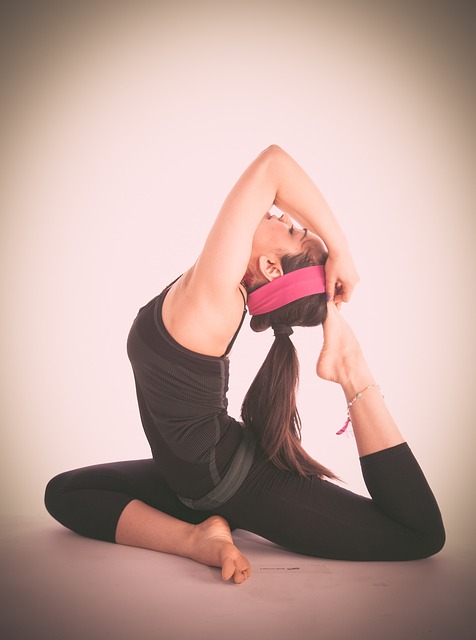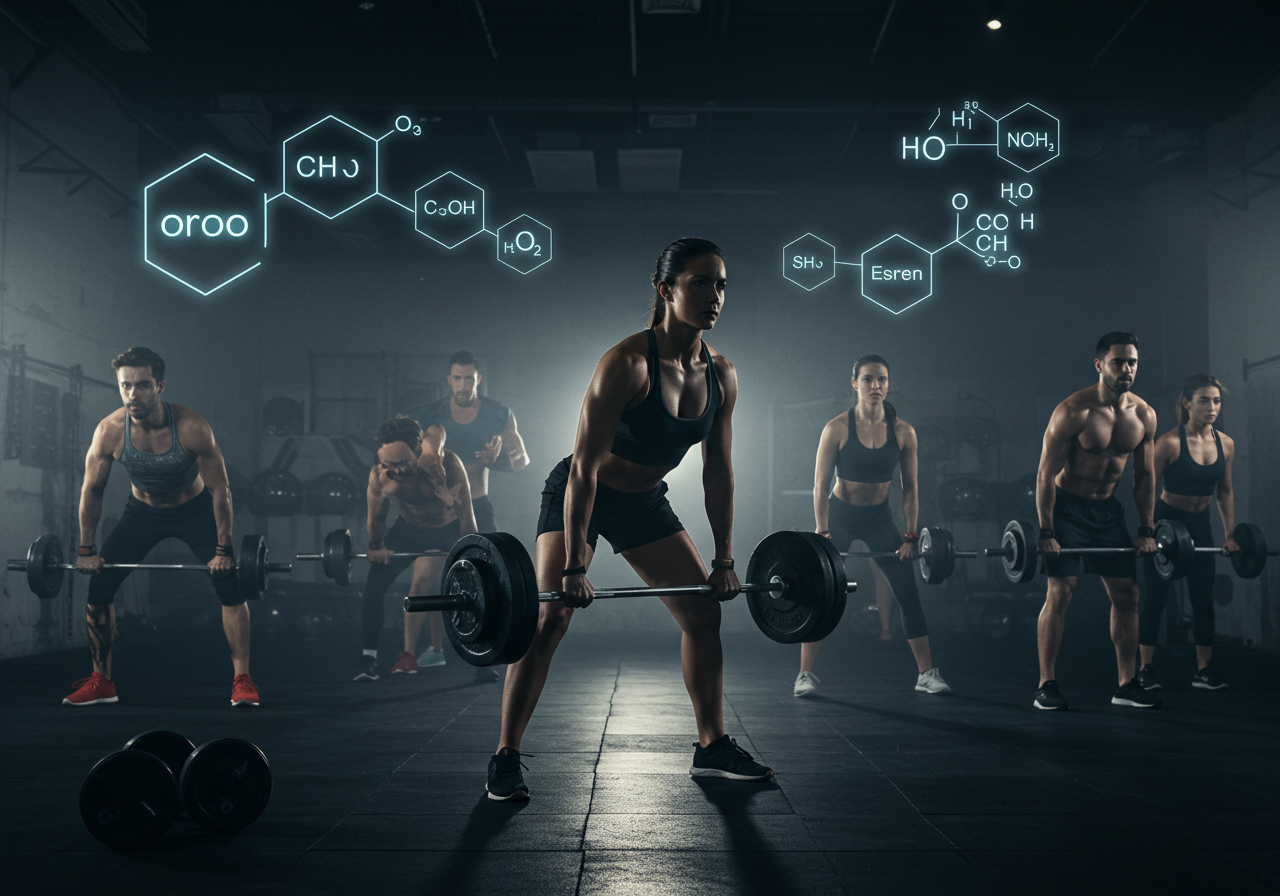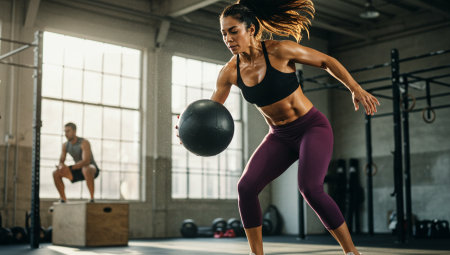
Cortisol, often referred to as the “stress hormone,” spikes under physical or emotional stress. In the short term, this hormone helps your body produce more energy, allowing you to power through a tough workout. However, when cortisol levels remain high for prolonged periods, it can hinder muscle gains and cause energy crashes. Think of cortisol as a double-edged sword: when managed well, it fuels your workouts, but when it gets out of control, it can derail your fitness progress.
Testosterone is crucial for muscle growth and fat loss. While it’s often associated with men, it plays a vital role for women as well. What’s the Role of Hormones in Fitness? When testosterone levels are balanced, it enhances muscle gain and supports fat loss, boosting overall fitness.
Estrogen, on the other hand, plays an essential role in recovery and mood regulation. Your ability to recover post-workout and maintain a positive mindset during intense training sessions is largely dependent on estrogen levels. Moreover, staying motivated and energized during workouts is directly influenced by this hormone.
Unlocking Muscle Growth: The Crucial Role of Hormones in Your Fitness Journey
When it comes to muscle growth, hormones play a pivotal role in shaping your fitness progress. Among these hormones, testosterone is one of the most influential. Regardless of gender, testosterone plays a crucial role in muscle growth by acting as the catalyst that helps you lift heavier and recover faster. Higher levels of testosterone can lead to more efficient muscle gains, making it a key player in your fitness journey.
Another important hormone in the process is insulin, often misunderstood and labeled as the villain in low-carb diets. However, insulin plays a vital role in transporting nutrients to your muscles after a workout. Think of insulin as the delivery driver, ensuring that proteins and carbohydrates are delivered to your muscle cells for optimal recovery and growth. It’s one of the ways a balanced diet works seamlessly with your body’s hormonal system.
Growth hormone also plays a significant role in your fitness journey. It acts as a reliable assistant, promoting the development of new muscle tissue while aiding in fat loss. Have you ever felt that post-workout rush of euphoria? That’s growth hormone at work, encouraging recovery and helping your body rebuild stronger muscles.
Even cortisol, known as the “stress hormone,” has its place in the puzzle. In short bursts, cortisol can benefit your body, helping it respond effectively to intense physical stress. However, too much cortisol can have the opposite effect, potentially hindering your progress by slowing muscle recovery and growth.
The Role of Hormones in Fitness: How Cortisol, Testosterone, and Others Shape Your Workout Success
When it comes to fitness, understanding what’s the role of hormones in fitness is crucial to maximizing your performance. One of the main hormones involved is cortisol, often called the “stress hormone.” Think of cortisol as your body’s alarm system, kicking in when you’re under pressure. A small increase in cortisol can give you an energy boost during a workout, but too much can turn your exercise routine into a struggle instead of a success. If you’ve ever found yourself feeling fatigued or struggling to finish a workout, high cortisol levels might be to blame, as it can lead to muscle breakdown and exhaustion. Managing stress isn’t just important for your mind—it’s essential for achieving the best results in your fitness routine.
Next, we have testosterone, a hormone often linked to muscle growth and strength. What’s the role of hormones in fitness when it comes to testosterone? This hormone acts like rocket fuel for your muscles, promoting strength gains and faster recovery. With more testosterone, you’ll have the energy and endurance to power through tough workouts and see faster results in your muscle-building efforts. If you’re working towards your dream physique, understanding testosterone’s impact on your training is key to transforming your fitness journey.

Balancing Act: The Hormonal Symphony That Drives Fitness Performance
When it comes to fitness, understanding the role of hormones in fitness is key to unlocking your full potential. Hormones are the conductors of your physical performance, orchestrating everything from energy levels to muscle growth and recovery. Let’s take a look at how these hormonal players influence your fitness journey.
Testosterone is one of the most powerful hormones when it comes to muscle building and strength. Think of it as a trumpet, delivering strength and energy to your workouts. If your testosterone levels are low, it’s like having a muted trumpet—you might feel like your workouts lack that extra push. But when testosterone is at the right level, it helps you lift more, recover faster, and build muscle with greater efficiency.
Next up is cortisol, often known as the stress hormone. While a little cortisol can fuel your workouts, too much can have a negative effect. Think of cortisol as a chaotic soloist—too much can derail your progress, stealing your energy and causing muscle breakdown. Managing stress is vital for keeping cortisol in check and ensuring your workouts remain productive.
Insulin, known for its role in regulating blood sugar, is another hormone that affects your performance. It’s like the gentle violin in this hormonal symphony, keeping your energy levels balanced. When insulin is in harmony, it helps shuttle nutrients to your muscles after exercise, enhancing recovery. However, when insulin is out of balance, you may feel sluggish, just like an out-of-tune string section.
And finally, there’s growth hormone, the natural repair specialist of your body. Think of growth hormone as the percussion section, driving the rhythm of your recovery. It plays a crucial role in muscle repair, fat burning, and overall recovery, especially after intense workouts. A well-balanced hormonal system ensures you’re not just surviving your workouts but thriving in them.

Why Hormones Matter: Exploring Their Impact on Weight Loss and Muscle Gain
Understanding the role of hormones in fitness is essential for anyone looking to achieve lasting results in their weight loss and muscle-building journey. Think of hormones as the conductors of an orchestra. When they’re in harmony, fat loss and muscle gain progress smoothly. However, when they’re out of sync, it’s like a chaotic band, frustrating your efforts.
Cortisol, often referred to as the stress hormone, can be a major disruptor when it comes to weight loss. While a little cortisol is normal, high levels can throw your body off track. Elevated cortisol increases cravings and promotes fat storage, especially around the belly. So, managing stress effectively is key to keeping cortisol levels in check and helping you stay on track with your goals.
On the other hand, testosterone and human growth hormone (HGH) are essential for muscle growth and strength. The role of hormones in fitness, specifically testosterone and HGH, cannot be overstated. These hormones enhance recovery, build lean muscle mass, and help you perform better in your workouts. Think of them as your personal trainers that never get tired, pushing you toward your fitness goals with every rep.
But it’s not just about lifting weights or cutting carbs. Your lifestyle choices, including sleep, diet, and stress management, directly influence your hormonal balance. Poor sleep or a bad diet can throw everything off, affecting your hormones and hindering your progress.

The Hormonal Blueprint: How Your Body’s Chemistry Shapes Fitness Results
When it comes to fitness, understanding the role of hormones in fitness can make all the difference in achieving lasting results. Let’s start with testosterone, a key player in muscle building and fat burning. Contrary to popular belief, testosterone isn’t just important for men—it’s crucial for women too. This powerful hormone fuels your workouts, helping you build muscle and burn fat. When testosterone levels drop, your energy levels follow suit, and suddenly, hitting the gym becomes less appealing. Keeping testosterone levels in check ensures you have the drive and strength to power through your workouts.
On the flip side, insulin sensitivity plays a huge role in fat management. Insulin sensitivity refers to how well your body handles sugar and stores fat. When your insulin levels are balanced, your body is better equipped to burn fat instead of storing it. Maintaining good insulin sensitivity helps you stay lean and energized, making it easier to shed those extra pounds.
Then there’s cortisol, the stress hormone. While cortisol is essential for managing stress and staying alert, too much of it can be detrimental to your fitness goals. Chronic high cortisol levels are linked to weight gain, particularly around the belly. It’s like a leaky faucet wasting your energy and sabotaging your efforts every time you try to make progress. Managing stress is key to keeping cortisol under control and preventing it from hindering your fitness journey.
So, how do you keep this hormonal orchestra in perfect harmony? The answer lies in simple lifestyle adjustments—balanced nutrition, regular exercise, and effective stress management. By paying attention to the role of hormones in fitness and making these small changes, you can optimize your body’s chemistry and navigate your fitness journey with ease. Instead of stumbling over hormonal imbalances, you’ll be stepping confidently toward success.




